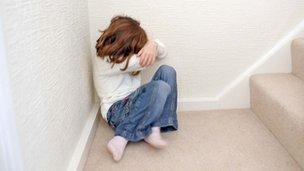Vulnerable children 'left in family home too long'
- Published

Local authorities look after more than 16,000 children in Scotland, according to Scottish government figures
Too many children believe they were left in the family home for too long and should have been taken into care earlier, a committee of MSPs has found.
Children and young people are also unhappy with the "intimidating, stuffy and stressful" hearings system which can decide if they are taken into care.
Holyrood's Education Committee was looking into decision-making processes around children in the care system.
The Scottish government said it would "look hard" at its recommendations.
Committee convener Stewart Maxwell said evidence from a range of witnesses, particularly from young people who have been in care, was "often shocking".
'Simply appalling'
He said: "We were told about a 'merry-go-round of placements' where many children come into care but go home again only to suffer further abuse and neglect.
"This is simply appalling.
"There's no doubt that deciding whether or not to remove a child from the family home and into care is one of the hardest decisions to make.
"However, we believe current decision-making processes do not always deliver the best outcomes for children and families.
"We must make sure that existing resources, in terms of staff and finance, are used more effectively."
Aspects of the children's hearing system are also cause for concern for young people, according to the report.
Mr Maxwell said: "Hearings were generally perceived as being intimidating, stuffy and stressful.
"There was also a common view that too many people attended, including professionals, such as educational psychologists, who saw the children irregularly yet were able to express an opinion."
The committee also raised concerns about the reported difficulties of retaining experienced social workers "on the frontline", where they can have direct contact with children and families.
Early intervention
The report included recommendations such as doing more work around the consequences of early intervention and implementing measures from the Scottish government and local government to improve staff retention in children's social work.
Work on establishing a "better, more rounded picture of a looked-after child's well-being" should be progressed as a matter of priority, it said.
Responding to the report, a Scottish government spokeswoman said: "We welcome this report by the Education and Culture Committee and its recognition of the steps the Scottish government has taken to support vulnerable children and their families.
"Securing the safety and improving the wellbeing of children is at the heart of all of our work to make Scotland the best place in the world to grow up for every child, regardless of their background or circumstances.
"We know that early intervention, security and good quality care are the keys to delivering safe, stable and loving homes for our children and young people - and we are building on our achievements to-date through the Children and Young People Bill currently going through parliament."
She added: "We will look hard at the recommendations and evidence in this report and issue our formal response as soon as we have had the opportunity to fully consider the important issues raised in it."
According to Scottish government figures, local authorities look after more than 16,000 children, with more than a third of these being looked after by foster carers.
Statistics have also indicated that 63% of looked-after children have one placement, about a quarter have two or three and 11% have more than three.
- Published31 May 2012